Croatia Logs 843 New Coronavirus Cases, 20 Deaths
ZAGREB, 21 March 2021 - In the last 24 hours, 834 new coronavirus cases and 20 related deaths have been registered in Croatia, the national COVID-19 response team said on Sunday.
The number of active cases currently stands at 6,922.
Among them are 982 people who are receiving hospital treatment, including 90 on ventilators.
Since 25 February 2020, when the first case was confirmed in Croatia, 257,639 people have been infected with the novel virus, of whom 5,773 have died and 244,944 have recovered, including 809 in the last 24 hours.
Currently, 22,914 people are in self-isolation. A total of 1,475,016 people have been tested to date, including 6,884 in the last 24 hours.
For more about COVID-19 in Croatia, follow TCN's dedicated page.
EU Funds Minister: Money From EU Funds to be Used to Bring Back Emigrants
ZAGREB, 21 March 2021 - In the next seven years, Croatia will work to absorb as much money from EU funds as possible and direct it to its less developed regions to improve citizens' living standards and stop emigration, Regional Development and EU Funds Minister Nataša Tramišak has said in an interview with Hina.
The minister noted that EU funds were changing Croatia for the better in all its parts.
"I want their impact to be felt by every citizen, and for them to stop negative demographic trends and bring back people who are now emigrating," the minister said, noting that she had personally planned operational programs for the regions of Slavonia, Baranja, and Srijem.
Surplus won't go to waste.
From 2014 to 2020, Croatia had at its disposal €10.7 billion of EU funds as part of the European Commission's cohesion policy, designed to help reduce differences between developed and undeveloped parts of the EU.
Projects contracts in the amount of 115% of the allocation have been signed, and in that regard, Croatia is at the very top in the EU, together with Ireland, Greece, Portugal, and Finland. Those countries, too, have signed project contracts whose value exceeds the amounts allocated to them.
The contracted surplus will be carried over to the new period, which began in 2021 and will last until 2027.
"Those projects will be carried over to the next period. There won't be any delays. We are talking about large projects such as railway infrastructure and water utility projects," she said.
The value of those projects exceeds €50 million. Small projects will continue as planned ad they should be completed by the end of 2023, the minister said.
"I believe that by then, we can implement all the contracted projects and thus absorb the entire financial envelope," said Tramišak.
While project contracting was satisfactory, what was problematic for smaller project beneficiaries was the slow payment of money into their accounts, with 50% of the €10.7 billion having been paid so far, which puts Croatia at the bottom of the EU ranking, along with Spain, Slovakia, and Romania.
In October, the European Commission said that this was because public procurement procedures in Croatia last long and that the Croatian administration imposes complex procedures on beneficiaries.
"Those procedures have been simplified, and they were made public in December, so every user knows how the body in charge of checking their costs and activities will act. We have also simplified procurement procedures for entrepreneurs. The conditions now are minimal," says the minister.
She notes that since she took office in August 2020, the amount paid to end-users has grown from 33% to 50%.
"We will continue additionally simplifying the procedures," she said, adding that there were no delays in payments.
Five goals
In the period from 2021 to 2027, Croatia will have €9.6 billion for cohesion policy goals.
The EC has requested from Croatia a list of priority areas for co-financing in that period. When the list is submitted and the EC approves it, the two sides will sign a strategic agreement, after which Brussels will start approving individual projects.
The minister said the list would be submitted by June.
Project proposals will have to meet one of the five goals set by the new EU regulations, and those are a smarter Europe, a greener Europe, a more connected Europe, a more social Europe, and a Europe closer to citizens.
Emphasis has been put on research, innovation, a stronger economy, enterprise and health system, science and education, and social care.
Investments in the infrastructure of towns, municipalities, and counties will continue through a special fund, said Tramišak.
The biggest project co-financed by the EU in Croatia so far is the Pelješac Bridge. For the time being, it is not known whether there will be any new major infrastructure projects.
"A decision on strategic projects has not been made yet. It will probably be discussed in the next two to three months, and the government will decide what those big projects will be. We will then know how much money we have in each operational program, and we will see if there will be any major projects like before," said Tramišak.
Once the programming period is over, project beneficiaries will have three more years to complete them until the end of 2030.
Earthquakes
Due to last year's earthquakes, Croatia was forced to seek help from the EU Solidarity Fund, with €683.7 million having been paid into the state budget to help remove damage caused by the 22 March 2020 earthquake in Zagreb.
"Those funds are now available for the reconstruction of Zagreb and its environs, and project calls have been published, contracting will start soon. We have until mid-2022 to use the money," she said.
Last week, Croatia sent a request for additional aid from the Solidarity Fund to Brussels, asking for €319.19 million to help remove damage caused by earthquakes Sisak-Moslavina County at the end of last year, and it remains to be seen how much money the EU will grant.
"We expect payments from the European budget very soon, during this year," the minister said.
Croatia is also a member of two EU macroregional strategies, the Adriatic-Ionian and the Danubian strategy, as part of which the EC finances cross-border projects.
Tramišak notes that most funding goes for cooperation with Bosnia and Herzegovina and Montenegro as part of that European territorial cooperation.
She says that €186 million will be available in the coming period for cross-border cooperation projects focusing on environmental protection, infrastructure, tourism, education, and connecting people.
For more news, follow TCN's dedicated page.
National Team Coach Hrvoje Horvat Reveals Croatia Handball Future
March 21, 2021 - National team coach Hrvoje Horvat reveals the future of Croatia handball.
In its 26 years on the world stage, Croatia handball has participated in 35 of 37 major competitions and won 14 medals. The Olympic handball tournament in Tokyo is the second big competition without Croatia, 21 years after Croatia failed to qualify for Sydney.
Hrvoje Horvat took over the team after Lino Červar resigned after the World Championship in Egypt. A month and a half later, with only three days of preparation, Croatia failed to turn the story around and missed out on the Olympic Games in Tokyo this summer.
Hrvoje Horvat is only now starting his representative career, and only now will he show why he was elected to the top position.
In an interview with Jutarnji List, national team coach Hrvoje Horvat looks into Croatia's future.
Have you gotten over Montpellier?
"We hurt. Of course, we wanted better, and it is not pleasant, especially not in this way where you have achieved part of the goal and plan. I’m talking about the game against France, something we could have influenced where we didn’t last. It will haunt us all for a while longer. The wounds are deep, the older guys to whom it was supposed to be the crown of their careers found it hard to accept and survive, but we have to move on. It's a sport. Sport does not allow for long celebrations after victories, nor long mourning after defeats."
Was three days too little time to change anything from Egypt?
"We knew we didn't have time to do big things. We tried to speed up the game as much as possible to score an easier goal, and I would say that we succeeded, but with two rotations, which are our biggest problem, we did not succeed much. The game fell hard on us because of that, and it is a matter that we have to solve urgently in the future. We will do that with a new selection of players."
What is your vision for a new Croatia?
"You should be very careful here because the best should play in the national team. We again have to look long-term and forward. The primary selection has to change; we have to speed up the game. 60 minutes to attack the full zone, where you spend a lot of energy. Without transition, it’s hard to endure an entire game. I want us to be variable in defense, like in the game against France from 5-1 to 6-0. While we had the strength, there were also results. Goalkeepers definitely need to support us more. That is the second biggest problem we have at the moment.
A shot from outside is a cancer of our wounds, and these are the most respected players in handball. Our priority in that sense must be the younger categories; we have to hone our talents and build players. This may not be a key segment of our game in the future, but it is a segment without which high-level handball cannot be played. The crucial problem is the change of defense - attack. My philosophy is that with the defense we try to close the central part of the zone; we have to work the density to avoid being attacked from the middle where the goal is the biggest and widest. We have to ask our goalkeepers to defend us well from wide positions. We have to do that by working with smaller categories all the way to seniors. I see the future. OK, we have potential, but the situation needs to be resolved quickly."
Does Croatia have the potential to do that?
"The luxury of big clubs are rotations; the players are used to that. Before, the coach had a problem getting the player out because he was angry, and now the players are asking you to put them on the bench to take a break. We have to adapt to that because the preparations are very short. There will therefore be situations where we will have to compromise, but with one good selection, we can significantly reduce that risk."
Is Croatia's defense the problem?
"In my opinion, the defense was very good, but when the opponent's goalkeeper has 14 saves, and ours 5, it significantly changes things. If it was the other way around, we would talk differently. Secondly, I said a bigger problem than the defense was because we changed two players who significantly slowed down our game. We won't do that anymore."
How do we resolve the goalkeeper issue?
"We need to draw the line and start solving problems. We will have to be fast first hand, but we also have to count in the long run. In general, already at the next gathering, we will have a picture of how I imagine it from the wings, goalkeepers, attacks because we do not have much time, the Euro is in just six months, and there we want to be good and competitive in a different way."
Horvat believes there will be a lot of changes.
"All the guys understand the situation. We may have had drama in history, but healthy and open communication solves everything. I don't mean to brandish a sword. A player plays in the national team because he deserves to play in the club and fulfills what we want.
In the first selection, we will introduce two or three new names by positions. And that will be it; we don’t have time to change constantly. We have to go to the European Championships with a vision of what we can build by 2025 and the World Championship we are hosting. We should know that the World Championship is important to us two years before qualifying for the Paris Olympics in 2024. The backbone must be known already at the Euros. Here, one should consider the problems with form, injuries; this cannot be avoided. But the backbone will be known.
I'm looking forward to the challenge; I'm ready for it. I think I did a good job in Dubrava, Našice, so I will do it on the national team."
You can read the full interview on Jutarnji List.
To read more about sport in Croatia, follow TCN's dedicated page.
Highlights of the Week: 5 Big Events in Croatia from March 15-21, 2021
March 21, 2021 – From the Mamić brothers verdict on Monday to Dinamo's historic match with Tottenham on Thursday, here are TCN's five highlights of the week from March 15 to 21, 2021.
As we look back and review the top news in Croatia over the past week, we realize just how much can change – and even history can be made. For Dinamo's fans, this week's match with Tottenham will surely be one of the most significant games, as they secured a place in quarter-finals of the Europa League after more than half a century. But that is not the only good sports news from Croatia this week!
From Monday to Sunday, we list five events featured on the front pages of news portals in Croatia.
Highlights of the week: Mamić brothers verdict
At the beginning of the week, the news of the brothers Zdravko and Zoran Mamić verdict resonated with the public. Namely, the Croatian Supreme Court has issued a final judgment and confirmed prison sentences for the Mamić brothers, former Dinamo director Damir Vrbanović, and tax collector Milan Pernar.
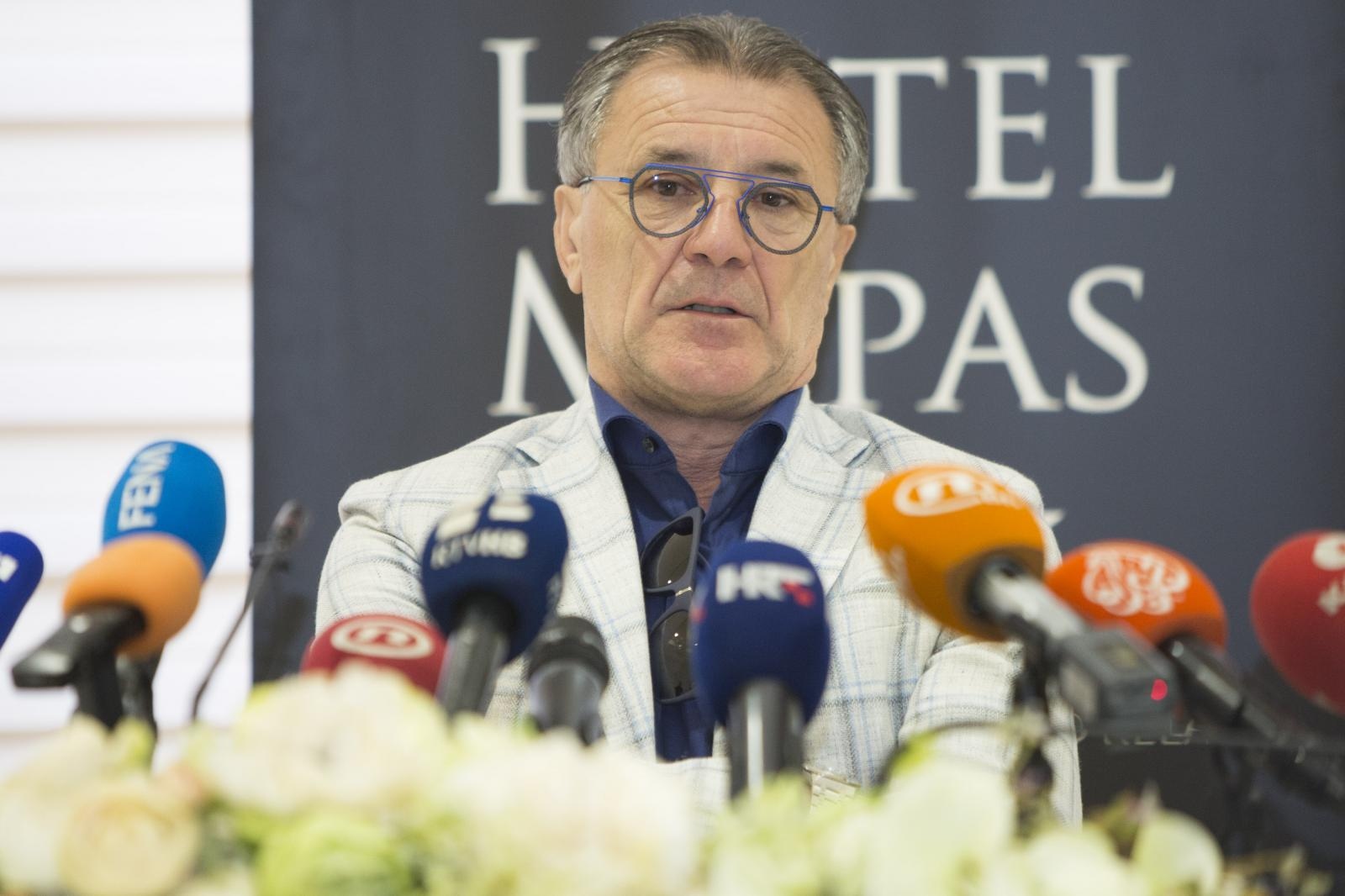
Zdravko Mamić. Photo: Denis Kapetanovic/PIXSELL
Zoran Mamić and Milan Pernar were found guilty of reducing Mamić's tax liabilities and accepting bribes, and Zoran Mamić was also found guilty of giving bribes. Zdravko, Zoran Mamić, and Vrbanović are guilty of splitting the Dejan Lovren transfer and Zdravko Mamić for splitting the Luka Modrić transfer.
Zdravko Mamić was sentenced to six and a half years in prison. Four years and eight months in prison were given to his brother Zoran Mamić, who resigned as Dinamo coach after the verdict, just three days before a crucial match against Tottenham. Former Dinamo director Damir Vrbanović was sentenced to three years in prison.
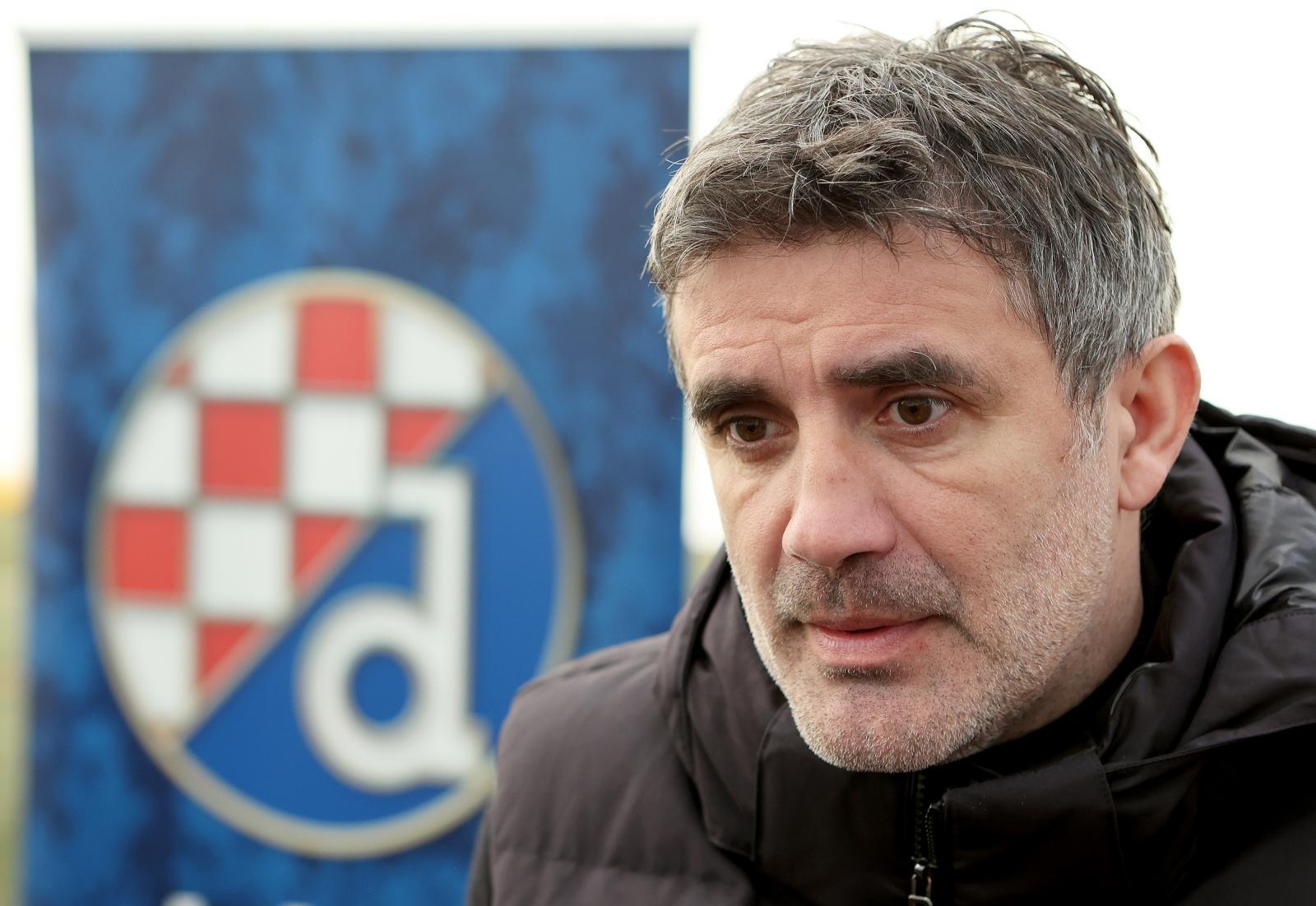
Zoran Mamić. Photo: Marko Prpic/PIXSELL
Also, Zdravko Mamić must return 52 milion kuna. According to the verdict, Dinamo was damaged by 80 million kunas in total. The state will also take their other assets, namely property, and cars.
Highlights of the week: Dinamo tops Tottenham and writes history
Regardless of the events in Dinamo earlier this week, the players showed all the quality on the field on Thursday and beat Tottenham 3: 0 (3:2) in a historic match. Thanks to the incredible game of Mislav Oršić, who was later named UEFA player of the week, Dinamo secured a place in the quarter-finals of the Europa League after more than 50 years!

Mislav Oršić. Photo: Goran Stanzl/PIXSELL
Dinamo thus created the first-class sensation, and this match will be remembered for a long time. A big celebration of Dinamo fans Bad Blue Boys and players followed the game in front of the Maksimir Stadium in Zagreb. Deservedly!
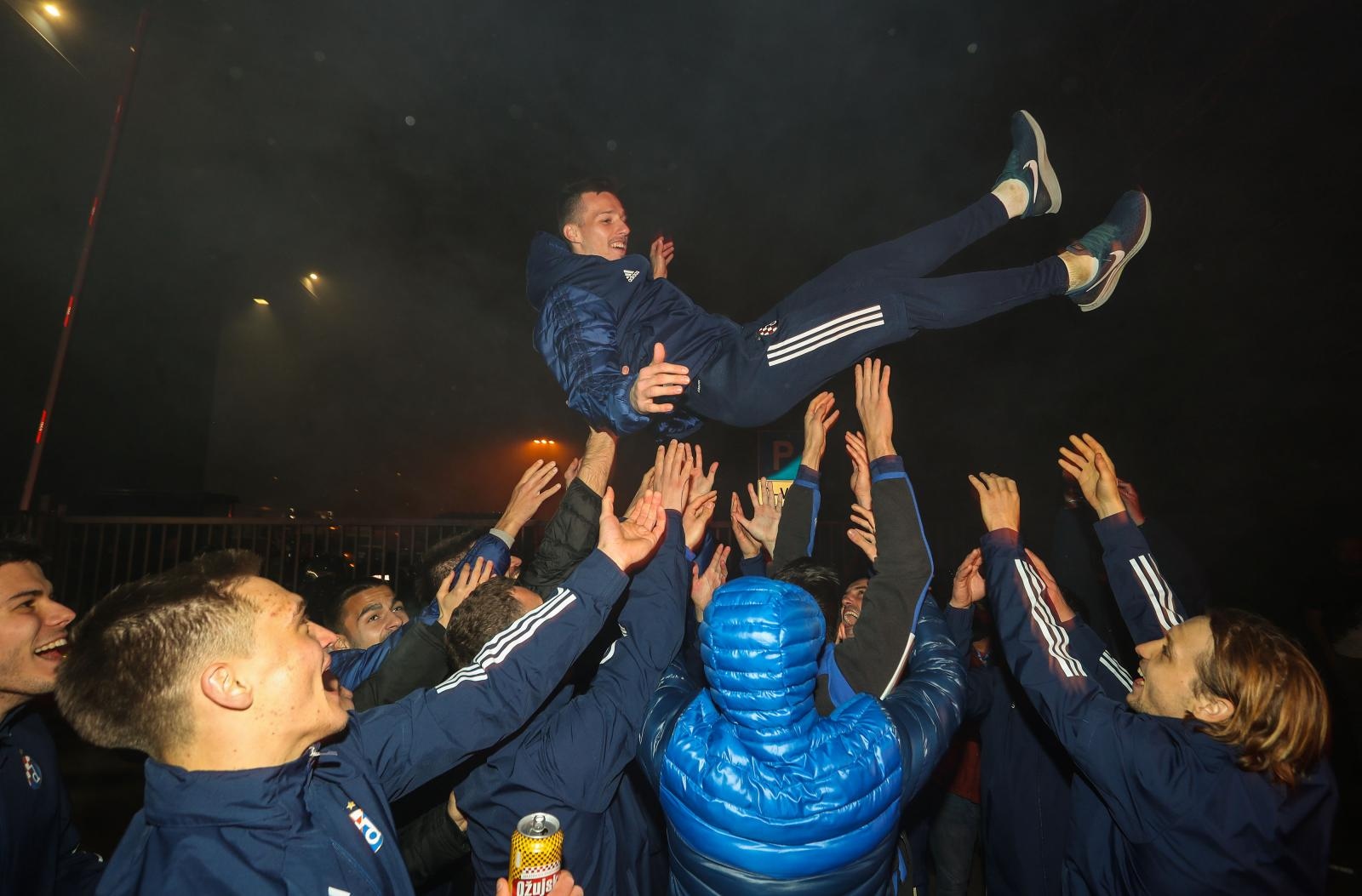
Dinamo fans and players celebrating after the match, Mislav Oršić in the air. Photo: Goran Stanzl/PIXSELL
Highlights of the week: The UK and Croatia tourist opportunities
Andrew Dalgleish, the British Ambassador to Croatia, visited Croatia this week to discuss tourism opportunities between the two countries with Croatian Tourism Minister Nikolina Brnjac.
As she pointed out, Croatia is ready to receive tourists from the UK, one of Croatia's most important tourist markets, as soon as the UK's epidemiological rules allow for that.
"We're pleased with the fact that the destination of Croatia is still perceived in the United Kingdom as high quality, desirable, and safe. A dialogue has been opened with the British side on travel facilitation modalities between the UK and Croatia," said Brnjac.
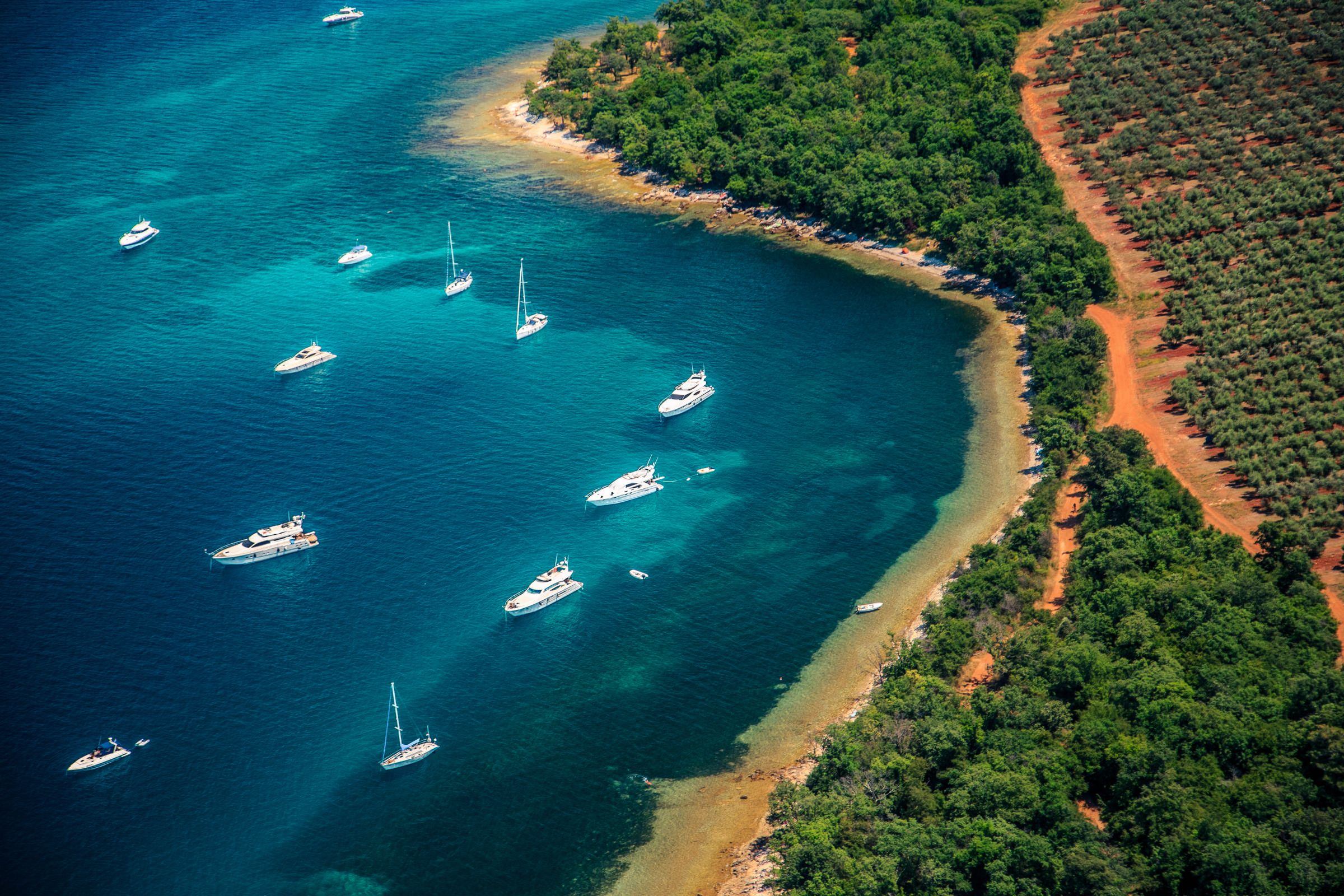
Photo: Romulić and Stojčić
She was even cited by the Daily Telegraph. Croatia's attempts to get the best out of the upcoming summer season are recognized by many other countries interested in traveling to Croatia.
Highlights of the week: Increasing number of new infections and citizens' dissatisfaction
As the pandemic rages on, the infection numbers started to grow again in Croatia, and now statistically younger people need respirators. With the increase in the number of new coronavirus cases that we witnessed this week, citizens' dissatisfaction with the current epidemiological measures has also increased.
To express their dissatisfaction, protesters gathered in five Croatian cities and protested against the measures, but also against the mandatory wearing of face masks.
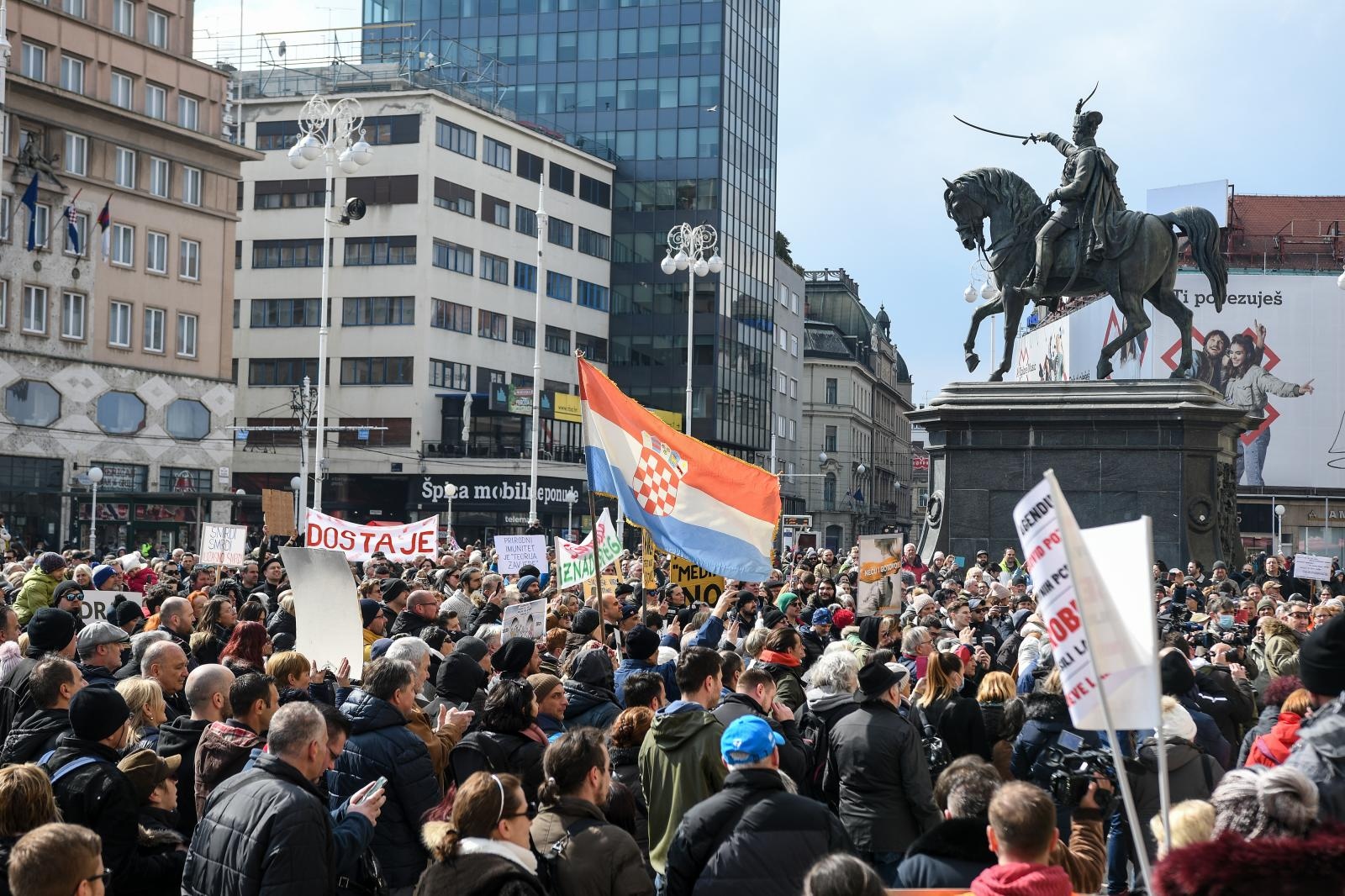
Protest against epidemiological measures in Zagreb, March 20, 2021. Photo: Zoe Sarlija/PIXSELL
Organized by the Rights and Freedoms Initiative, Croatians in Zagreb, Dubrovnik, Split, Šibenik, and Osijek thus supported the protests in about 40 countries worldwide under the slogan "World march for freedom, peace, and democracy."
Highlights of the week: Filip Zubčić wins second place in Lenzerheide
Croatia is truly a home to great athletes. As if we haven't seen big results in Croatian sport this week, Croatian skier Filip Zubčić took care of the even better end of the week, winning second place in the Lenzerheide Grand Slalom.
Zubčić had an excellent performance in the last giant slalom of the season. After ranking third place in the first run, he finally won second place, 20 hundredths of a second behind French skier Alexis Pinturault. In the overall ranking of skiers, Zubčić is fifth with 744 points.
To read more about sport in Croatia, follow TCN's dedicated page.
To follow all news from Croatia, subscribe to our newsletter.
Croatia's Best Wrestler Božo Starčević Secures Tokyo Olympic Spot!
March 21, 2021 - Croatian Greco-Roman wrestler (up to 77 kg) Božo Starčević advanced to the finals of the qualifying tournament for the Olympic Games and thus secured a spot in Tokyo!
HRT reports that the current best Croatian wrestler and the fourth-ever Croatian wrestler to compete in the Olympic Games (Rio 2016) will fight for gold in Budapest against Russian wrestler Alexander Chekhirkin, who defeated Bulgarian Aik Mnatsakanian in points in a controversial semifinal (7-6).
Starčević defeated the Czech wrestler Oldrich Varga in points in the semifinal (3-1). He was better than the Pole Mateusz Lukasz Wolny and led a difficult fight in the quarterfinals against the Azerbaijani wrestler Sanan Sulejmanov. It ended 1-1, but Starčević went further because he was the last to score a point.
Of the other four Croatian representatives, Marko Koščević reached the bronze medal in the category up to 130 kg, and in Sunday's repechage, Ivan Lizatović (up to 60 kg) and Danijel Janečić (up to 67 kg) will be able to make it to the medal match.
Lizatović was pulled into the repechage by German Etienne Kinsinger, who defeated him in the quarterfinals (8-2). Janečić lost in the quarterfinals to Georgian Ramaz Zoidze (8-0), who easily advanced to the finals, allowing the Croatian wrestler to continue. Lizatović will fight against the Estonian Helary Maegisalu, and Janečić will have to defeat the Ukrainian wrestler Artur Politajev.
Unfortunately, only the finalists of the tournament in Budapest win a spot at the Tokyo Olympics this summer, meaning neither Lizatović nor Janečić will advance to Tokyo.
Koščević was also supposed to be given a repechage round, but the Norwegian Oskar Marvik handed him the match without a fight.
Ivan Huklek lost the first match in the category up to 87 kg and was defeated by Armenian Artur Šahinjan on points (6-2).
To read more about sport in Croatia, follow TCN's dedicated page.
80 Electric Bikes on Krk Island Significantly Improve Tourist Offer
March 21, 2021 - 80 electric bikes on Krk Island can be enjoyed by locals and tourists from April 1, 2021!
The United Nations World Tourism Organization (UNWTO) estimates that there are currently more than 60 million active cyclists in Europe, and cycling tourism is one of the most promising backbones of active tourism. On the island of Krk, cycling tourism was completed through the KrkBike project, which is extremely important for raising the quality of life on the island, both for foreign tourists and locals, developing the tourist economy, and branding the island of Krk as an eco-destination. On the island of Krk, there are over 300 kilometers of manicured bike trails, reports HRTurizam.
Two years ago, the Krk Tourist Board, in cooperation with all tourist boards on the island, developed mobile applications KRKhike and KRKbike, which allows you to search for hiking and mountaineering trails as well as GPS navigation routes. A training program for bicycle guides was also recently held on the island of Krk.
But cycling is much more than bike paths, and in the past 5 and more years, there is a strong demand for electric bicycles, public bicycle systems, and scooters, as well as stations for charging electric cars through sustainable tourism.
Thus, in Krk town and all Krk municipalities, bicycle rental stations have been built, consisting of a control cabinet, 10 stands with electric bicycles and a bench for charging laptops and mobile phones, and repairing bicycles.
The e-bike rental systems of all local government units are networked so that the e-bike can be rented at one location and returned to another location. The advantage of such a concept is the connection of the entire area of the island and the networking of municipalities and Krk into one whole, just as it was done with the project of electromobility through electric cars.
Currently, about 80 electric bicycles are available on the island of Krk. The public rental system of electric bicycles on Krk Island will be active from April 1, 2021, if epidemiological conditions allow it.
“Cycling tourism on the island of Krk, along with summer vacation tourism, is becoming our main tourist product. Destinations that offer opportunities for active holidays attract guests throughout the year, and guests get to know both natural and cultural sights in the destinations, which promotes sustainability," said Ivana Kovačić, director of the Krk Tourist Board.
The KRK BIKE system has been established at nine locations-stations on the island of Krk: Baška, Dobrinj (Klimno), Krk, Malinska-Dubašnica, Omišalj (center), Omišalj (Njivice), Punat, Punat (Stara Baška), and Vrbnik, covering most of the island.
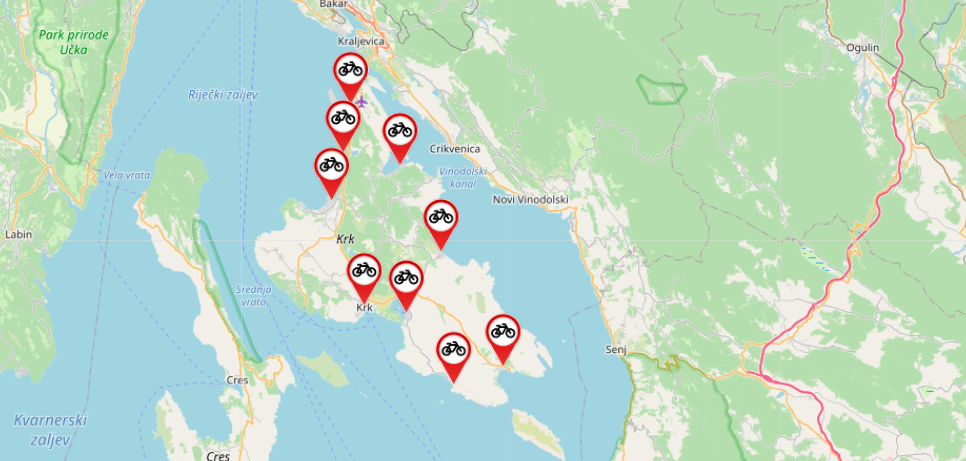
"In the town of Krk, we have one station consisting of 10 electric bicycles, benches with sockets for charging mobile phones, laptops, and electric bicycles that are out of the system, i.e., electric bicycles for casual passers-by. There is also a stand with a bike repair tool and an electric compressor to inflate the tires. A 17-screen control panel where advertisements and announcements of tourist events can be displayed," Kovačić points out, adding that currently, all tourist boards are involved in the stronger promotion of these contents, as well as informing all stakeholders about the possibilities of use.
"Due to the uncertain start of the tourist season, conditioned by the coronavirus pandemic and the further sequence of events, this year we are working more intensively to make the system even better," says Kovačić.
The system was installed in 2020 under the jurisdiction of the company Ponikve eko otok Krk d.o.o. and is easy to use. It only takes three steps to activate the service (registration, payment, and QR code scanning). It is important to point out that there is support for the system through the dispatch center, provided 24/7. A person on duty to help on the road, daily inspection and tour of all stations, returning bicycles to the stands, and possible repairs.
Despite last year's worse tourist season, there were about 3,000 rentals on the island of Krk from May to October. The rental price is 20 kn / hour, and the electric bike can be rented from 0 to 24 hours.
Find out more information about electric bicycles on Krk island HERE.
For the latest travel info, bookmark our main travel info article, which is updated daily.
Read the Croatian Travel Update in your language - now available in 24 languages.
Burgers, Pizza and More: Croatian Food Delivery During Pandemic Skyrockets
March the 21st, 2021 - Croatian food delivery during the pandemic reached new heights as the majority of people were working from home, not working at all, or just fancied a taste of the food from beloved restaurants which at that time had only deliveries as a way of remaining operational.
Wolt, Glovo, Pauza and other perfectly square shaped bags attached to people hurrying along on bikes or motorcycles has become the norm in cities such as Zagreb, but just how much food have we in Croatia been ordering since the pandemic struck?
As Poslovni Dnevnik/Sergej Novosel Vuckovic writes, while most people were busy wearing only half an outfit for their zoom meetings as they worked from home, others worked out there in the field more intensively than ever, making sure that everyone who was at home could still get their hands on some of their favourite foods, even if some were coronavirus patients who likely couldn't even taste it.
One year ago, Croatian food delivery services became a much needed part of life as the "new normal" took hold, into which we were drawn by the pandemic, and in that sense the likes of Glovo proved to be a reliable partner for many Croatian residents ordering food, medicine, or other items.
"Croatian food deliveries using the Glovo application have increased by more than 300 percent since the beginning of the coronavirus pandemic here in Croatia when compared to the time before the pandemic hit", they stated from Glovo, revealing what was most ordered and where.
Pauza, Wolt and others are also heavily present in various Croatian cities, and Glovo for example is present across eleven cities (Zagreb, Split, Rijeka, Osijek, Zadar, Sisak, Pula, Karlovac, Velika Gorica, Varazdin and Slavonski Brod). Data from the analysis of orders indicate that people's purchasing preferences have changed considerably because habits themselves have altered.
The differences by cities also speak about the cultural peculiarities of their inhabitants during the pandemic.
"Users in Zagreb ate twice as many carrots as those in Split did, but in Split, it seems, fresh cucumber salad was more popular than carrots were. Despite the disagreement in the preferences related to salads, both the citizens of Zagreb and the people of Split agreed on one thing - the inhabitants of both cities love beer very much,'' Glovo stated humourously.
Burgers which have been an absolute hit at various streetfood festivals over recent years, with the temporary disappearance of mass gatherings of people, have also quickly had to move online - so many have been ordered in the past 12 months that, stacked side by side, they would be as long as the entire Adriatic Highway, meaning that burgers were frequent ''riders'' in the bags of Croatian food delivery services.
Not only that, all of the Pizzas bought through Glovo in Croatia would form, if stacked, a tower as tall as 36 Zagreb cathedrals (with or without the cross which destroyed back in the earthquake last year).
"Glovo users ate 1,500 kilograms more oranges during the pandemic than they did before, and one of the most sought-after terms in the app at the beginning of the lockdown was - yeast, whose order and sales volumes were so high that more than 5000 loaves of bread could have been baked from it!'' they pointed out from this Croatian food delivery app.
In addition to food and drink, flowers were ordered thousands of times throughout the year as the opportunity to deliver them to loved ones and put a little smile on their faces during these dark times always seemed to be attractive.
For more on Croatian food delivery services/apps, eating and shopping in Croatia, follow our lifestyle page.
Croatian Company Bobis Opens One of Most Modern Factories in Region
March the 21st, 2021 - The Croatian company Bobis is a very well known name in Dalmatia, serving some of the nicest confectionary that goes down very well with a three hour coffee in the sun. This baked goods production company has taken important steps forward regardless of the pandemic.
As Poslovni Dnevnik writes, Bobis, a Dalmatian leader in bakery and confectionery production and one of the most important Croatian companies in this popular field, has opened and put into operation a brand new, extremely modern factory in Solin near Split.
This is one of the most significant events in the history of the company founded back in 1949, whose name is one of the most recognisable Split and wider Dalmatian brands with a long and highly respected tradition.
The value of this significant investment stands at over 150 million kuna, the funds were invested in the construction and equipping of a new factory as well as the adaptation of the old administrative building.
The new production facilities are spread over two floors with a total usable area covering 13,200 square metres. The basic goal in the realisation of this important investment for the Croatian company Bobis is the modernisation and automation of production processes while maintaining traditional production methods that guarantee the quality of the final products, applying the latest technical, technological and hygienic standards and occupational safety standards, which makes Bobis' brand new factory one of the most modern in the entire region.
The key strategic determinant of the Croatian company Bobis is the application of traditional production methods and recipes as a guarantee of high quality of final products, where Bobis is profiled as a "craft" bakery whose focus is placed primarily on the production of healthy products without additives using natural yeasts.
The production capacity of the new factory is over 60 million products per year, and in the foreseeable future the plan is to further expand the capacity by an additional 40-50 million products per year. The total product range consists of 400 bakery and confectionery items, with the possibility of expanding the range through new products and innovations, for which the Croatian company Bobis has been extremely well known since its very inception.
Today, Bobis is a company with 67 of its own sales outlets, and its products are also available in the sales network of Tommy, the leading retail chain on the Adriatic coast.
The company employs 600 workers who make a key contribution to the business results, and in whose development they continue to invest.
For more, follow Made in Croatia.
Anja Cancar from Krizevci Kicks Off Own Business During Pandemic
March the 21st, 2021 - When it comes to the pandemic, it's rare to hear about anyone succeeding economically unless they perhaps make protective face masks, hand gel or some other form of PPE, but not everything is quite to bleak. Anja Cancar from the continental Croatian town of Krizevci for example, decided to take a creative path just before the virus struck Croatia.
As Poslovni Dnevnik/Ivan Tominac writes, Anja Cancar, who is id rather ironically an economist by profession, decided to throw herself into a not-so-popular business. This young woman decided to dip her feet into candle wax, not quite literally of course. Anja decided to start making candles in February last year, just before things went south for Croatia and much of the rest of Europe. Today, she also has her own business.
"We've always had candles in the house - some normal ones, some fragrant ones. It seemed like a good idea to me for the very reason that I'd give it to someone myself, so why not make a nice, fragrant gift,'' began Anja Cancar. Briefly and clearly, it all started as a little experiment, and her candle-making skills from the idea to this point have advanced considerably.
“I learned by watching, trying, reading, learning and the method of trying and failing. A lot of material failed in the beginning of making candles. Even today, I have cans that are filled with that 'failed' paraffin," said Anja Cancar.
Failed paraffin is a thing of the past for her, and now she already knows exactly what the temperature hould be, how many drops of oil are needed and what paraffin she needs. This is another reason as to why experience makes all the difference, and now that she has mastered the entire candle making process, she is able to describe, and in a very simple way, the process by which her candles are made.
“Although it takes over an hour and a half by itself, the production process is easy to describe. The first step is to cut the paraffin, and the same is then melted down into a double-bottomed bowl.
Temperature is a key factor in making a candle - I pay attention to the temperature of pouring the essential oil, adding stearin and pouring into cans. I add the essential oil either alone or in pairs. I have three candles on sale that are a combination of scents, while the other three are independent scents,'' explained Anja Cancar.
If we're talking about production only, Anja Cancar makes all of the candles herself, but she also has associates in the accompanying activities. Her boyfriend helps her with the physical work, and her fellow citizens help with design and labels. So we can talk about the product as a local one from Krizevci, and although this is what makes a difference in itself, the fact that Anja does this all while maintaining a steady job, is a clear link with dedication.
“I think my candles are special because I'm present in their creation, I promote them, I come up with their names… Making candles relaxes me, I like to light a candle and I love its discreet scent.
We aren't all the same, so my candles won't suit everyone, but there are always those people who order my products, and that's enough for me to know that I'm doing something good, at least to some extent,'' added Anja Cancar.
As we've already mentioned, there's now a registered trade behind Anja's work. It took her two months from the first attempt to take that step, and she considers the decision to be the biggest challenge she has ever faced. However, she didn't think she was wrong in doing so, and having everything in black and white was her guiding thought.
“I’ve been in business for a full year now, I started making candles in 2020, back in February, and they first appeared on Instagram in April. I don't count the number of candles I've made anymore. I’m glad when someone calls and orders a candle, or when one of my friends tells me how their parents liked the candles and that they light them often. Then all the numbers are irrelevant because I'm glad that someone knows where those candles come from,'' Anja noted.
According to Anja Cancar, the costs of opening a business were minimal, and it was necessary to register with the State Administration Office and then open a business account.
Her focus, however, remains firmly on perfecting the production itself, and the fragrances she first created are the Mediterranean with lavender and rosemary, Amber enriched with ylang-ylang and lemon extracts, and Robust with rose and sandalwood.
For this young entrepreneur, candles are a departure from a somewhat grim and boring reality at the moment as the pandemic rages on.
For more stories like Anja's, follow Made in Croatia.
Zagreb Software Company Develops Motorway Traffic Reporting Solution
March the 21st, 2021 - One Zagreb software company has developed an innovative solution for the reporting of traffic and crowding on motorways.
As Novac/Bernard Ivezic writes, after Greece, Italy, Romania, the Netherlands and Lithuania, Croatia, like all other EU member states, will have to introduce the EU-Alert system in the next year. So far, sirens have been informing drivers on the country's motorways about sudden dangers and issues, and now they will send out SMS/text messages.
The Zagreb software company BISS, which also develops solutions for predicting motorway congestion and advanced mobile identification, has already developed its own IT solution for EU-Alert.
Aleksander Radovan, the development director of the aforementioned Zagreb software company, says that by developing technology that could be used in the fight against the ongoing coronavirus pandemic, they came up with a solution they call "SMS alerts".
''This is a service by which people in a certain area, if there are problems, are sent out a targeted SMS/text message notification that something is going on, and this will soon become an obligation at the European Union level,'' explained Radovan.
He added that those who haven't heard the sirens for whatever reason will also receive the SMS notification. Such a notification, we learn, doesn't necessarily have to arrive via SMS, but other widespread communication systems can be used to send it, such as sending a message via messaging/calling apps like WhatsApp and Viber. Radovan stated that thanks to their own development of new products, they have further accelerated revenue growth. He estimated that last year, this Zagreb software company increased its revenue by 40 percent compared to what they earned back in pre-pandemic 2019, and in 2021, he expects the same dynamics of revenue growth.
''We work mainly for foreign clients and we have software products that make delivery and crisis management more efficient, and that's what is currently most in demand,'' explained Radovan.
As a result, this Zagreb sofrware company increased its staff from 15 to 40 last year despite economic woes and entered the artificial intelligence (AI) segment. The new project they're working on is the development of advanced mobile device identification, which would confirm a user's identity on their mobile phone and then allow them to use it as the ultimate identification device. BISS is developing this technology together with Hrvatski Telekom (Croatian Telecom) and Sedam IT.
This Zagreb software company is already testing another, its own, new product on Croatia's motorways. It is software that predicts downtime and accidents. It does this by collecting data on the road conditions, weather forecasts, information from road management companies and monitoring the movement of mobile phones and vehicles connected to the internet. Based on this, it can reduce crowds in the peak tourist season when things become very busy.
''Currently, the majority of our income comes from a solution for the anonymisation of data in accordance with GDPR and a system that provides accurate addresses on shipments,'' concluded Radovan.
For more Croatian innovation, follow Made in Croatia.


